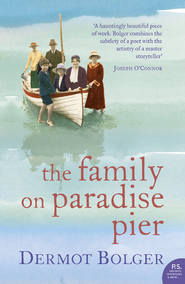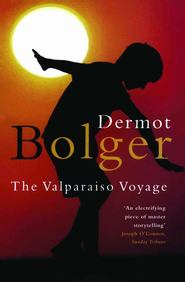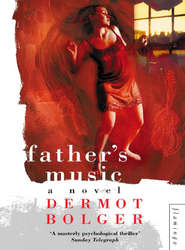По всем вопросам обращайтесь на: info@litportal.ru
(©) 2003-2024.
✖
Temptation
Автор
Год написания книги
2018
Настройки чтения
Размер шрифта
Высота строк
Поля
Sheila was asleep before the car slowed on the narrow road twisting through woodland slopes into Ashford. They would have to wake her now when they reached Mount Ussher Gardens and the child might grow cranky later in the journey. Danny was quiet. Last year he would have prattled away until he fell asleep, pointing out passing tractors to the stuffed giraffe he once took everywhere with him. He still cuddled into that tattered giraffe after bedtime stories and sometimes stumbled into their room at night, half asleep, upset that his beloved toy had fallen behind the bed. But Alison knew this was the last year the giraffe would make the journey to Fitzgerald’s.
She had told him not to read in the car but Danny had taken out the Shoot football magazine which he now ordered in the newsagent’s instead of his Batman comic. He was intently studying match reports of obscure English third division games. She could see their names highlighted in the dense text on the page he had turned over. Southend, Doncaster, Brentford, teams and towns that could have no meaning for him. Yet his eyes seemed mesmerised, absorbed in a foreign language that took him further and further away from her. Danny, her firstborn, a gentle child never quite fitting in anywhere but happy to hover on the edge of some horde of boys. How much longer before he stopped climbing into her bed for a dawn cuddle? But he still needed her and would for a long time to come. That’s why she had to be here for him and for them all. That’s why, during the previous three months, she had been too scared to talk to anyone.
‘I know what happened, Mammy,’ six–year–old Shane had informed her recently as she pushed him on a swing. ‘Danny must have fallen at school and banged his head. That’s why he started liking football.’ Shane had swung his feet in the air, satisfied at solving the mystery of his brother’s conversion to soccer and, with it, his abandonment of the endless games of Batman and Robin he’d once devised for them both.
Shane was more babyish than Danny had been at that age but tougher as well. He’d always known his own mind. Danny was malleable, but even at a few hours old when Alison had put Shane to feed at her breast she’d felt a resistance in his neck. She’d let him go and his tiny mouth had found her nipple by itself. Shane would grow up in his own time as his own man, with nothing to prove to anybody. For now he clutched his Paddington Bear proudly in the car and would refuse to eat everything except bread when they reached Mount Ussher Gardens.
The car park just beyond Ashford was on a dangerous bend. You were almost past before you saw the entrance. A German camper van was leaving. Peadar eased into the free space and she cautioned the boys against jumping out with so many cars about. Peadar got them out and put their coats on. Sheila was sleeping so peacefully that Alison was tempted to tell them to go ahead while she remained in the car until the child woke. But something – the engine being turned off or the shudder made by the slipstream of a truck thundering past – caused Sheila’s eyes to open. Danny would fly into a rage and sometimes get sick if woken, but Sheila just smiled now as if delighted to see her mother anxiously leaning over her.
Alison unstrapped her. Peadar and the boys had already passed the antique shops. Stopping at Mount Ussher was part of the ritual too, the midway point between Dublin and Wexford when she could finally relax. A week of preparation went into these five nights away. Washing, sorting clothes, packing. It always took longer than expected, with Peadar hovering while she frantically crossed things off her list and their tempers flared up.
In previous years the journey to this point was spent wondering what had she left behind, if the windows were double–locked or the alarm definitely on. But this year felt different. Suddenly she didn’t care if the house burnt down when they were away. At least the battered kitchen would have to be replaced then.
The sun emerged after a squall of rain. Everything glistened as she walked, holding Sheila’s hand, beneath the archway of climbing plants to the tea rooms. The air felt like a benediction: the wet leaves, the excited laughter from her sons, the trees swaying in the gardens beyond. In January, when Dr O’Gorman’s cold hand had examined her breast, Alison had felt sure she would never stand here again, except as a dying woman or one scarred for life.
Why had she never told Peadar? She would tomorrow night, sipping complimentary Irish coffees on the long sofas in Fitzgerald’s. He would take her hand, near tears, and scold her for not having spoken. He would not trivialise it by going over the details repeatedly. She liked the clear–cut way that he absorbed information. He would ask one or two questions then lapse into silence, squeezing her hand before suggesting they return to the room. Holding hands, they would walk up the long corridor, where a baby always cried behind some door, and pay the babysitter off early. Their lovemaking would be silent so as not to wake the children, but with an edge caused by the knowledge of how fragile their world together was. Finally and fully she would have his attention.
She had been right to carry the dead weight of this worry alone. The weeks of waiting would have gnawed at Peadar. He would have hated the powerlessness of being unable to do anything, just like he had dreaded having to watch impotently while Alzheimer’s drained away his mother’s personality. Fear would have come between them, cancer taken possession of the house, filling their dreams and waking thoughts. In some lost fragment of his childhood, which she had learnt never to intrude upon, she was sure that his terror at not being in control was born.
But although in January she had been concerned about the tiny lump on the underside of her breast, she had expected reassurance from Dr O’Gorman and confirmation that it was just a cyst. Instead he had insisted on a mammogram. The public waiting list was months long. It was simpler to go privately, using the children’s allowance money she kept in a separate account. She was a nurse herself she’d informed the radiographer: he could tell her straight out. But people’s attitudes changed once they realised you had left nursing to work as a stay–at–home mother. She’d had to return to Dr O’Gorman, who would make Eeyore the donkey seem cheerful. He had insisted that the only way to ensure the cyst was benign was to remove it.
Even then, in mid March, she never told Peadar. She had lied instead on the morning of the procedure, claiming that she was going to help out Ruth, whose marriage had broken up, by staying with her overnight. The operation was in the same hospital she’d worked in. They had treated her like royalty – in at nine a.m., woken in mid–afternoon to be told the cyst was benign and sent home in time to read stories to Sheila. She couldn’t stop trembling in the taxi, released from the scenario where she would have to tell Peadar how her breast was to be removed and that, even then, they didn’t know how far the cancer had spread.
Instead she simply told him that Ruth hadn’t needed her to stay over. She had hoped he wouldn’t want to make love because of the soreness, but, during the previous months Peadar had never even noticed the small cyst develop, never mind now become aware of the tiny neat stitch on the underside. Lately he was too preoccupied in his world of contractors and architects. It hurt her when he barely noticed how much weight she had lost since Christmas, how pale she had looked or how red her eyes were at times.
When he did notice anything, it was to accuse her of sulking, being grudging in her support when he needed it most. He knew that he wasn’t pulling his weight at home, he would say, but the school extension was almost built. Just these final crucial weeks and then the damn thing would be finished. An achievement nobody had thought possible. After that he’d be at home so much that she would grow sick of him. So why this long face and brooding, he would ask, just now when he’d so much to cope with? Then always, as if promising a child a treat, he would add, ‘And remember, we’ll have five whole nights to ourselves in Fitzgerald’s.’
Five nights. Was this all her life boiled down to? On a dozen occasions she had bitten her tongue, tempted to scream at him. Yet these five nights would make up for so much. This scare would bring them closer together, by reminding them how some day – hopefully not for decades yet – one of them would be left to cope alone. All the bricks and mortar in the world couldn’t compensate for closing a front door at night and knowing there was no one left to really care whether or not you woke again the next morning.
If the children weren’t with them Alison might have told Peadar now on that secluded bench in the gardens overlooking the Ventry river where they had made love late one rainy afternoon sixteen years before. Alison, with the tear that Peadar had found in her skirt, sitting astride him with his flies undone. Thankfully not even the gardeners were moving about that day, but by the end they wouldn’t have stopped or cared. Their excitement had been addictive, the feel of him thrusting through the material, the creak of an old beech tree overhead, the dark river gushing over rocks and a solitary heron taking flight before their eyes. The gardens were closing by the time they had left, with just their bicycles in the car park. Her dress was stained but she hadn’t cared. She had cared about nothing that summer, except that she was twenty–two and free, on a dirty weekend with her first love who had come back after three years to find her.
Peadar was already ordering food in the tea rooms. The old lady in the hunting jacket was in her usual place beside the antiques, guarding the door into the gardens. Three local women ran the tea room. They remembered Peadar because of his fondness for rhubarb streusel. Danny was eyeing the rich cakes, but once they had a good walk it was unlikely he would get sick later on in the car. Alison scanned the menu, wondering was there anything she could persuade Shane to taste. Maybe she could invent a game to coax him into trying chicken. She envied women whose sons ate like horses. Yet Shane was tall and healthy, existing mainly on milk and cheese.
None of this was important, she reminded herself, or at least not at this moment. Let Shane drink what he likes. Let Danny have two cakes or three. Childhood was short and her own seemed to have been spent forever gazing in through invisible windows, being denied the things she saw inside and made to feel guilty for even wanting them. Not that her parents were mean, but the Waterford she grew up in had felt like it was ruled by some headscarfed matriarch with pursed, disapproving lips. It was a different world for children now. They were a family together on the sort of holiday she had only ever known once as a child. She had survived her scare, even if for days after getting the all–clear she had burst into sudden inexplicable tears, alone in the kitchen.
Peadar glanced at her now as the lady filled his tray.
‘You look flushed,’ he said. ‘Are you okay?’
‘I’m fine,’ she replied. ‘Just fine.’
The woman mashed up potatoes, carrots and gravy for Sheila and heated them in the microwave. Even with coaxing, the child would only eat half of it but there was enough goodness in that. Alison had plain biscuits wrapped in tissue for afterwards. She knew that both Sheila and Shane would enjoy them far more than any dessert.
The children stormed out into the gardens after they’d finished, while Peadar was still paying the admission fee. The azaleas were in bloom, stretching out before her eyes in pinks, yellows and whites as Alison walked through maple trees towards the river. Parts of the grass were deliberately cut long to give the woodlands a feel of half wilderness, half exotic Eden. Peadar appeared behind her, taking her hand but urging her on, anxious not to lose sight of Shane as the boy climbed up rough steps to a suspension bridge leading to the owner’s house located on a man–made island in the river. Alison called for Shane to run after Danny and Sheila who had disappeared among the trees. She wanted to stroll in peace with Peadar along the wide avenue of hanging rhododendrons.
There was an octagonal wooden house at the end where she remembered changing Danny, the first year they went to Fitzgerald’s, when everything was new and she was frantic about being a mother. The fear she might drop him, the incessant worry that caused her to wake several times a night to check his breathing in the cot.
Danny now gripped Sheila’s hand as he pushed ahead towards the shallow stretch of river, hoping to see the solitary heron there again this year. Another talisman of their journey. Even at eight the boy was caught up in this ritual. The riverbed was empty. Danny cupped his hand over his eyes, straining to glimpse the bird. She called out that the heron was probably hunting along the far rapids and Danny disappeared across the bridge into a tunnel of old overhanging trees.
Shane followed, running along the maze of woodland paths, while Peadar called for them not to get lost. She let go of Peadar’s hand, tired of being hurried, wanting to enjoy the cool shade of those gnarled trunks. Her family moved ahead, with Sheila demanding that Peadar carry her. From Danny’s cries she knew he had found the entrance to the secret path built along girders down a tiny tributary of the river. The steps descended to the water, with ferns and moss crowding the steep banks on either side. Sheila was frightened of falling in and wriggled away to run back to Alison.
She sat on the grass with her daughter, watching Peadar hold each boy’s hand as they negotiated their way slowly along the girders that were almost submerged in the green water. They disappeared in and out of shade, with patches of sunlight igniting the ripples that sparkled around them. This was a moment she knew she would remember when they were all gone from her. The three men in her life, calling excitedly to each other as they stooped beneath archways and rocks. Then their voices went silent, as if the riot of trailing plants along the riverbank had somehow ensnared them up inside a magical green world.
Peadar’s car–phone rang as they descended the twisty mountain road beyond Rathnew, stuck behind a horsebox being pulled by a jeep in a tailback of Sunday afternoon vehicles. Alison thought he had remembered to turn it off. He glanced across, with a sheepish grin. She knew he couldn’t resist picking it up.
‘Just once,’ she warned him. ‘If it rings again it’s going out the window.’
It was McCann, of course, fretful and over–conscientious as usual. Alison had grown to dread his voice calling at ridiculous hours about trivial matters. At first she had thought this was his method of retribution against Peadar for taking the principal’s job that outsiders felt he had patiently waited in line for, during his decade as vice–principal, before Peadar was headhunted for the post. But gradually she’d realised that his obsequiousness was without irony or malice. McCann was a natural lieutenant, not a leader. He lived alone, with classical music always in the background when he phoned, seemingly oblivious to the disruption caused by a midnight call.
‘I know,’ she heard Peadar say. ‘I passed the site. There were seven then … maybe another two have bunked off. But the deadline is in place with penalty clauses, so they’ll just have to work longer in the evenings.’
There was a silence as Peadar let McCann fret on. The secret was to wait until McCann paused for breath and then get your goodbyes in fast. Peadar braked as the horsebox slowed even more.
‘If he’s got three sites going at once then that’s Nolan’s problem,’ Peadar interjected. ‘He can switch workmen around all he likes once he meets his commitments to us, because he knows he’s not getting another red cent until I can see my face shining in the floor tiles.’
Peadar replaced the receiver, making a deliberate show of switching the phone off.
‘Sorry about that,’ he apologised.
‘No, it’s reassuring,’ Alison replied. ‘Once I’m sure McCann is still in Dublin I know he can’t pop his head out of the petrol tank if we stop to fill it up somewhere along the way.’
Peadar smiled, knowing her views on the vice–principal. She used to tease him in bed by inventing blind dates for McCann, her favourite being to pair him off with Mother Teresa.
The Enid Blyton tape had run out. Alison turned it over. Pip, Fatty and Daisy continued outwitting the fat policeman, Mr Goon, on side two. Danny was fascinated though he had heard it a dozen times before. Shane was happy beside him, playing some game with Paddington Bear. And Sheila … Sheila was simply happy, like it was a gift she’d been born with. Sheila, with the same jet–black hair as herself, whom they very nearly didn’t have. They had even seen a doctor about Peadar having the operation before finally deciding to go once again. Three boys would have been too much, but Alison had been certain from the moment Sheila was conceived that there was a girl inside her. Never mind that she had felt the same about Shane for nine months and told anyone who asked her. This time she’d known in her bones and kept the secret to herself.
She turned to smile at her daughter as Peadar edged in and out, trying to glimpse the winding road ahead where a gap was developing between the jeep and horsebox and the cars in front. Sheila smiled back, almost conspiratorially. Sheila who never lost her temper, even when a note arrived before the start of the Easter holidays ten days ago stating that Jean O’Connor in her class had meningitis and Alison had driven her daughter crazy, shining lights in her eyes and searching for a rash at every hour of the night. Sheila who would be her companion when the boys and Peadar were off at football games. Boys leave home and leave their mothers, but girls never quite do. They row and argue in their teens, worrying their mothers senseless, but in the end gradually become friends and confidantes in a way that no son could ever be. That’s what she had missed, with her own mother dying of cancer when Alison was twenty–two. The pendulum had never swung back. There was so much they could have talked about now, so many questions Alison would love to ask. She reached one finger out and Sheila’s hot hand wrapped itself around it, twiddling with the eternity ring she loved to turn in the light.
‘Are we there yet, Mama?’ she asked.
Alison shook her head as Peadar indicated and pulled out. At once she knew something was wrong by the intake of Peadar’s breath. Alison looked around. He was on the wrong side of the road, just where the white line started to break up. A blue van was coming towards them, but there would be time for Peadar to pull in again in front of the jeep pulling the horsebox. The problem was the black BMW with lights flashing behind them. She had noticed the bearded driver’s impatience earlier on and sensed how his constant swaying made Peadar nervous. Now the driver was trying to simultaneously overtake them and the jeep. The man was beeping furiously, screaming at Peadar through the glass like it was his fault. Peadar veered in front of the jeep, putting his foot down to try and create enough space before the BMW swerved into the side of them. The blue van flashed past. Alison screamed, waiting for the crash but somehow the BMW had managed to squeeze in behind them, mainly because the jeep braked hard, sending the horsebox swaying about on the road.
The BMW’s lights were only inches from their back bumper, feet away from her children. Peadar was rattled, shouting at Alison for screaming, cursing the lunatic behind them. The BMW pulled out again without indicating and sped into the distance. Alison could see two teenage girls looking back at them vacantly through the rear window.
Peadar said something and she snapped back. Then they both went quiet, anxious not to frighten the children more. She raised the volume on the tape, sat back and stared ahead. Peadar went slower than usual, even though the road was clear. Cars overtook them, flashing back at twenty and thirty miles above the speed limit. He looked across after five minutes and took her hand in his free one.
‘It wasn’t my fault,’ he said quietly. ‘I’d never take chances with you all in the car. It was that lunatic.’
She squeezed his hand and said nothing. What would it matter whose fault it was if they were all dead on the roadside? She wished they were in the hotel already, the children splashing about in the pool and her outside in the Canadian hot tub. The tape ended. Three voices called out different requests, but she ignored them, not even looking for music on the radio. She needed silence to get her wits back. She wanted to close her eyes as she always did at some stage of this journey and become a child again, counting off the miles in the clank of wheels as the train brought her mother and father and herself on that one magical holiday to Fitzgerald’s.
They didn’t stop again on the way down and the children were quiet, leaving her to her memories. Arklow was now by–passed and Enniscorthy wasn’t too slow. As Peadar picked up speed along the banks of the Slaney with the asylum perched on the cliffs above them, she searched for the Gingerbread Man tape. There was something about the snatches of classical background music and the narrator’s voice saying ‘at the blip turn the page’ that conjured up for her the pent–up expectation of every journey they had taken on this road. She could remember playing it for Danny when Shane was a baby and then for Shane when Sheila was teething beside him in the car. Even at home when she put it on and closed her eyes she could see this stretch of road and feel the spring sunshine through the windscreen as the car sped along these last few miles.
The boys protested at the choice of tape but she told them that it was Sheila’s turn to hear something.
‘Just twenty miles,’ Peadar told Danny, ‘and we’re there. No more towns or anything, just open road.’
Wexford town was long by–passed, taking the Rosslare traffic away from those cramped medieval streets she had first glimpsed as the train trundled slowly over wooden quayside sleepers the summer she was twelve. Holding a bottle of Guinness by the neck, her father had pulled down the carriage window and stared out, lost in memories of which she had no part.
Weeks before, when the notion of a special holiday to mark his silver wedding anniversary arose, her father had been adamant about doing it in style by taking his wife and young daughter down to Fitzgerald’s. It was the first time she had ever heard of the hotel, but he began describing it as like a palace. His own father had taken him there by train from Waterford for lunch when he made his Confirmation in the 1930s, an extravagant day trip they had spent years talking about. And the summer after he left school at fourteen he had got a kitchen job there, living in, and bathing on the private beach every evening.










